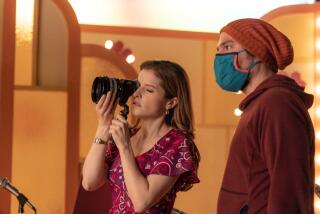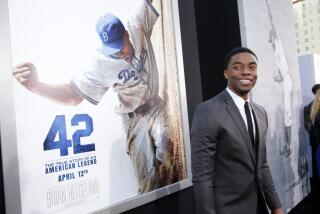Wide, safe swing for ‘Bobby Jones’
America loves its heroes and none more so than those from the world of sports.
With jurisprudence and steroid scandals soaking up most of the ink in today’s sports sections, it’s only natural that a hero from the past would carry a certain unassailable appeal. Golfer Bobby Jones, winner of 13 major championships -- which in his time were the U.S. and British Amateurs, along with the U.S. and British Opens -- fills the bill with his reputation for integrity and courage backing up his ample game.
Unfortunately, “Bobby Jones -- Stroke of Genius,” director Rowdy Herrington and producer Kim Dawson’s faithful record of the golf great’s life, is marred by a flat, conservative script and an overreliance on the tried and true. It feels like a movie we’ve seen before.
Jim Caviezel, trading in his crown of thorns from “The Passion of the Christ” for a pair of plus-fours, plays a man who overcame physical and emotional obstacles to become the greatest golfer in the world, only to walk away at the age of 28 to be with his family and pursue a career in law.
The film opens with Jones’ triumphant return to St. Andrews, Scotland, site of some of his greatest victories, six years after his retirement from competitive golf, and it is immediately clear that the filmmakers are working in the realm of sports as mythology with the golfer as one if its deities.
The stirring music swells with Jones’ drive from the first tee and seldom lets up after that. The film then flashes back to his childhood when, as a 6-year-old in ill health, Wee Bobby (played by Devon Gearhart) began thrashing a ball across the Georgia countryside. By the time he debuted at the U.S. Amateur as a towheaded 14-year-old prodigy (Thomas Lewis) in 1916, Jones had the skill and determination that would carry through his dominance of the golf world in the 1920s.
He also caught the attention of Atlanta sportswriter O.B. Keeler (Malcolm McDowell), who would become Jones’ friend, confidant and biographer. Writing of Jones’ pursuit of the four major championships in 1930, Keeler coined the phrase “the Impregnable Quadrilateral.” The term Grand Slam would only to come to popular use later on as other golfers chased the prize.
For better and worse, the independently produced film boasts all the qualities of a Hollywood movie. It proceeds episodically and apart from the initial flashback, chronologically, taking a pro forma approach in its storytelling. Nothing terribly surprising happens and what drama does exist is lost among the litany of details from Jones’ career obscuring the more significant character-building moments in his life.
Herrington, familiar from action-oriented films such as “Road House” and “Striking Distance,” co-wrote the screenplay with Tony Depaul and Bill Pryor from a story by Herrington and Dawson.
Historical golf figures such as Walter Hagen (Jeremy Northam) and Harry Vardon (Aidan Quinn) are entertainingly played but feel like archetypes -- or worse, plot devices.
Even the supporting characters who get the most screen time, Keeler and Jones’ wife, Mary (Claire Forlani), get short shrift, used for narrative effect as Caviezel putts, chips and drives his way to victory after wrestling with his legendary temper.
At least in broad strokes, the film brings to mind old-fashioned sports biopics such as “Pride of the Yankees,” but juiced with an ‘80s lushness and bombast lifted from “Chariots of Fire” and “The Natural.”
Composer James Horner’s score is reminiscent of the one he did 15 years earlier for “Field of Dreams,” particularly the “If you build it, he will come” riff, which at the very least unintentionally heightens our expectations of supernatural intervention. (Tiger Woods arriving from the future, striding out of a stand of dogwoods brandishing his sand wedge?)
That’s not to say there aren’t some good things in the film. Foremost is the cast, headed by Caviezel, who turns in his customary intense performance to persuade us of Jones’ determination to succeed.
The cinematography by Tom Stern, who most recently did Clint Eastwood’s “Mystic River,” captures both the beauty of first dawn glistening on dew-soaked greens and the sleekness of the Jazz Age in all its creamy nostalgia.
Shot in Scotland and Georgia, the visuals have a buffed authenticity, and the costumes and production design are detailed re-creations of the Gatsby-like accouterments of natty clothes, country clubs and motorcars.
By sticking safely to the middle of the fairways, making par after par rather than taking any of the risks that would make it worthy of its subject, the filmmakers have sold themselves and Bobby Jones short. “Stroke of Genius” is long on craft but short on drama, leaving it far short of the green.
*
‘Bobby Jones -- Stroke of Genius’
MPAA rating: PG, for language
Times guidelines: Genteel sports drama; smoking seems excessive but accurate for period
Jim Caviezel...Bobby Jones
Claire Forlani...Mary Jones
Jeremy Northam...Walter Hagen
Malcolm McDowell...O.B. Keeler
Connie Ray...Clara Jones
Brett Rice...Big Bob
Bobby Jones Film presents a LifeN production, in association with Dean River Productions, released by Film Foundry. Director Rowdy Herrington. Producers Kim Dawson, Tim Moore, John Shepherd. Executive producers Dave Ross, Rick Eldridge. Screenplay by Rowdy Herrington, Tony Depaul and Bill Pryor, story by Herrington and Dawson. Cinematographer Tom Stern. Editor Pasquale Buba. Costume designer Beverly Safier. Music James Horner. Production designer Bruce Miller. Running time: 2 hours, 1 minute.
In general release.
More to Read
Go beyond the scoreboard
Get the latest on L.A.'s teams in the daily Sports Report newsletter.
You may occasionally receive promotional content from the Los Angeles Times.











